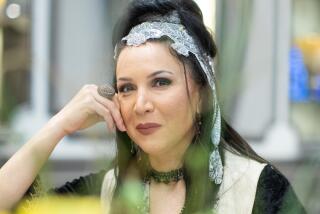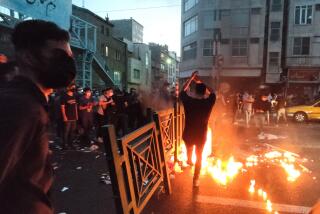Virtual state’s utopia clicks with young
BEIRUT — His hand adorned with silver rings, the self-proclaimed emperor of Nowheristan struck his slim iron cane firmly on the table, quieting a group of twentysomething Lebanese gathered around him.
“All great projects in history started this way,” he said, casting a piercing look at his audience while toying with his cane. “Any new, extravagant idea is always considered at first a hallucination.”
Half showman and half intellectual, Michel Elefteriades, 37, was describing his imaginary land of Nowheristan, where boundaries cease to exist and individual identities become scrambled.
“Nowheristan is not a sect,” he said. “I am not some sort of a guru or prophet.”
Over the last two years, Elefteriades, a poet, composer, painter and leftist activist of mixed Greek and Lebanese descent, has attracted more than 50,000 “citizens of Nowheristan” over the Internet.
He also has produced a record album bearing the name of his utopia and conducted a dozen workshops in Europe and the Middle East to convince young audiences that an all-embracing just and warless nation is conceivable.
According to Elefteriades’ vision, decisions affecting the world should be made by hundreds of elites living in special villages. Politicians would be stripped of their powers everywhere.
Wealth would be redistributed, with Europeans able to enjoy revenue generated by Persian Gulf oil while Africans could benefit from the West’s technological advancement.
One of the region’s most acclaimed alternative music producers, he has plunked down $300,000 of his own money to finance Nowheristan, which even has a flag: a blue circle representing Earth, surrounded by a golden halo symbolizing affluence, on a black background that denotes his movement’s anarchistic roots.
An international group of 25 musicians forms “a national orchestra of Nowheristan,” playing fusions of Arab, Gypsy and a dozen other musical influences.
If he’s a crackpot, he’s keeping some high-powered company. He launched Nowheristan in 2005 in Beirut’s UNESCO Palace at a ceremony attended by Lebanese Culture Minister Tarek Mitri and Geir Pedersen, the United Nations secretary-general’s representative to Lebanon.
Elefteriades says he is scheduled to meet in spring with controversial Latin American leaders, including Hugo Chavez of Venezuela and Rafael Correa of Ecuador.
“People everywhere are fed up with the way the world is today,” said Elefteriades, who on this evening wore billowy pants and a silk vest embroidered with 18th century French motifs. “But change is possible.”
For his efforts, he’s also brought on quite a bit of trouble. Last year, he launched a campaign in Lebanon urging people to stop paying taxes to the “corrupt” government, outraging a group of bankers and officials who threatened to ruin his business, he said.
His obsession with Nowheristan has also affected his personal life, almost destroying his marriage.
Undaunted, he says he is determined to spread the word about his utopian nation through mobilization on the Internet and seminars.
“The time will come to go into action,” Elefteriades said. “The march towards Nowheristan, like Gandhi’s movement, is going to be peaceful.”
In the cafeteria of his Beirut nightclub, several dozen Nowheristanis and other curious visitors listened to him as he alternated between light anecdotes and quotes from Gandhi, Albert Einstein and Karl Marx.
“The reason for this general malaise is the predominance of identities: racial, ethnic, religious, political,” he said. “In Nowheristan, people share a common identity.”
Elefteriades says his turbulent youth in a war-torn country with a dizzying array of religious groups as well as his many voyages around the world showed him that all cultures and civilizations share a common essence.
Growing up during Lebanon’s 1975-90 civil war, he rebelled against his parents’ conservative Christian environment. As a teenager who idolized Che Guevara, he was stopped by Christian militias while distributing communist tracts. Later, he briefly joined the army and fought against the Syrians before escaping when Damascus’ troops took over.
He first fled to Paris in 1990 but returned here a year later. Angered by the political reality in postwar Lebanon, he formed a clandestine armed group to “fight against sectarian parties and foreign interference in the country,” he said. The group, which he called the United Movements of Resistance, carried out acts of sabotage against politicians and organized strikes in universities across the country.
In 1993, he escaped an assassination attempt when a bomb placed under his car exploded while he was nearby. Fearing for his life and those close to him, Elefteriades fled to Paris, then decided to settle in Cuba. Disappointed by what he found there, he returned to Lebanon in 1997.
Since then, his music business has prospered -- he owns two recording studios, a music production house and downtown Beirut’s thriving Music Hall. He is working on opening branches of the Music Hall in other cities in the Middle East and Europe.
And, though he put a lid on his former gun-slinging ways, he retained a penchant for political activism.
Four years ago, he came up with the idea for his imaginary nation.
“Nowheristan is my priority today,” said Elefteriades, who is channeling cash from record sales into the movement.
“Revolutions are usually funded by drug-dealing money. I am financing mine from music.”
More to Read
Sign up for Essential California
The most important California stories and recommendations in your inbox every morning.
You may occasionally receive promotional content from the Los Angeles Times.










